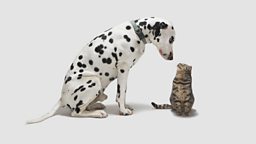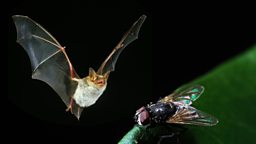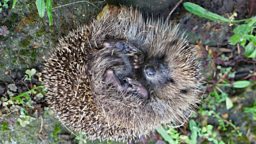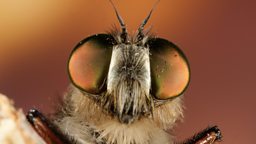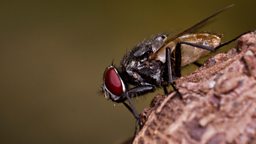7 children’s questions about animals - answered by Steve Backshall and other experts

In a children’s special edition of The Infinite Monkey Cage, Brian Cox, Robin Ince and a panel of experts are put through their paces by an audience of curious youngsters at Cheltenham Science Festival.
The guests – naturalist Steve Backshall, vet Jess French, and comedian and former doctor Adam Kay – ponder, who would win in a battle between a shark and a crocodile? Why don’t dogs sweat like humans? And will AI one day allow us to communicate with animals?
Here are the experts’ answers to eight of the inquisitive children’s questions.
1. Who would win a fight between a shark and a crocodile? (Freya, age 13)
“Those battles are happening all the time,” says Deadly 60’s Steve Backshall. “For example, you have bull sharks going way up stream in Africa and coming into contact with big crocodilians like Nile crocs.”

You get different winners depending on who bites first, who’s biggestSteve Backshall
The largest crocs, including the saltwater and the Nile, will exceed 6 metres in length and can weigh more than a metric tonne. The biggest great white shark is 6.4 metres and getting on for 2 tonnes. So, it’s purely a question of scale, says Steve. “You get different winners depending on who bites first, who’s biggest.”
The location of any head-to-head is of course also crucial. “If it’s on a tennis court or something, I think the money’s got to be on the crocodile,” jokes Adam Kay.
2. Why don’t we have tails like our ancestors? (Leo, age 7)
Although as embryos we all have tails, these disappear at around seven weeks gestation, leaving behind just our coccyx. The full-blown tail has not been a thing for a good 20+ million years, since we diverged from our monkey friends, Adam Kay explains.
“Around the time that we became bipedal people, so just using our two legs, we don’t need it for any of the balancing or swinging on trees or the swatting away flies because we’ve got other things like hands to do that.”
Also, any extra bit of body uses up energy so anything that isn’t needed “falls by the wayside”.
3. If birds have backwards-facing knees, can they jump further backwards than forwards? (Kit, age 11)
Birds walk on their toes, so what we’re seeing in the middle of a bird’s leg, facing backwards, is actually their ankle, explains vet Jess French. Their knee is higher up, hidden under feathers, facing forwards, “and so their jumping mechanism is largely similar to ours.” But there are some animals with backwards facing knees, like bats, and they are “terrible” at jumping, she confirms.

However, Steve Backshall argues that this backwards facing ankle does in fact make it hard for birds to jump forwards. Birds with long legs can leap straight up, and leap “backwards beautifully” but if they’re going forwards, they’ll do it with an elongated neck rather than with a leap. “Forwards is harder because of that anatomy.”
4. Of all the deadly animals you’ve seen, which are you most afraid of and why? (Ruby, age 10)
In the case of most animals, their danger to us is “massively overstated”, says Steve Backshall. Sharks, crocodiles, bears, lions, tigers – the number of people that they harm around the world is “almost incidental.”
“The one animal I’m genuinely always frightened to be in close proximity with is the hippo,” admits the naturalist. When filming in Zambia recently, Steve’s crew surprised one at night and it went off at a full sprint. “You can’t believe that an animal that is three tonnes in weight with those little stubby legs can run that fast.”
“They are grumpy, they are territorial, they’re unpredictable… They are without question the most frightening animal to be alongside,” says Steve.
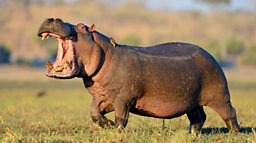
5. Why don’t dogs sweat like us? (Ernest, age 8)
“Dogs have a brilliant other way of cooling themselves down,” says Jess. On a hot day they’ll spend a lot of time panting. “But they do actually also sweat, just from a few parts of their body.”

I think that some point in the future we are going to be able to communicate with animalsJess French
Sweating through fur isn’t effective, but they will sweat from the pads of their feet and from their nose. “Quite often, because dogs get really stressed when they come in to see me at the vet’s, you’ll see a little trail of sweaty pawprints across the floor.”
Humans might sweat more than other animals because our ancestors did a lot of long-distance hunting, suggests Steve. “That ability to be able to regulate your body temperature over long pursuits of other animals could be one of the reasons why we do sweat in the way that we do, when a lot of other animals don’t.”
6. Do you think that advances in AI mean that in the future we will be able to communicate more with animals? (Kit, age 10)
“Yes,” says Jess, “I think that some point in the future we are going to be able to communicate with animals.” She thinks technology might allow her to speak directly with a dog in her surgery, rather than with its owner. “At the moment we’re still quite far away from that reality,” says the vet, but we’re collecting lots of data about sounds and actions that creatures use to communicate.
Scientists are currently developing technology, using AI, to analyse sperm whale coda (or chatter). They’ve been breaking down those codas and starting to find patterns that are inevitably going to lead to us understanding simple functions in their language, explains Steve. The ability to talk back to them might be a long way off, but “the tantalising possibility that we could find out what they’re saying is, to me, one of the most exciting areas of organism biology.”
7. How do protozoa harm humans? (Rees, age 10)
“Protozoa are types of germs,” explains Adam. “Bacteria and viruses obviously get top billing – they’re the headlining germs – but there are also other ones on the smaller stages like fungi, helminths (which are worms) and protozoa.”
Most types of protozoa don’t harm us, he says, they just hang around in your gut. (“They’re in there because you’ve eaten poo at some point!”). But some do. The most dangerous creature on Earth is the mosquito, argues Adam, because of malaria – a protozoal illness.
“A mosquito bites you, the protozoa go from the spit in the mosquito into your bloodstream, which goes to your liver where the bugs reproduce and cause some potentially very serious illnesses, responsible for over 600,000 deaths a year.”
-
![]()
'Beastly Bodies' Kids Special with Steve Backshall, Jess French and Adam Kay
Brian Cox and Robin Ince are joined by special guests and put to the test by curious kids.


